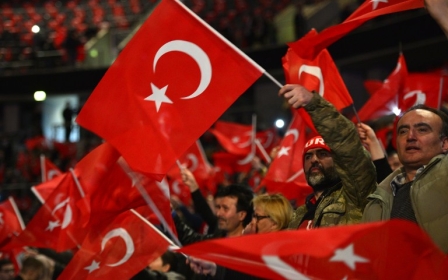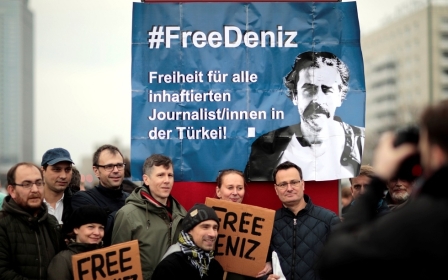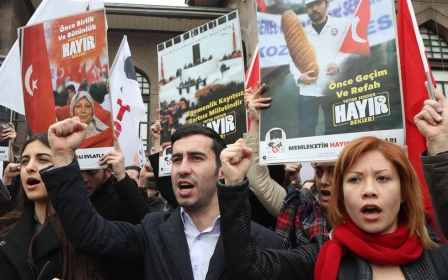Erdogan: German journalist is a spy and member of PKK

Recep Tayyip Erdogan has said a German journalist arrested in Turkey is an "agent" and member of the banned Kurdish PKK, as a row with Germany continued to escalate on Friday.
Deniz Yucel was arrested on Monday and charged by an Istanbul court of spreading terrorist propaganda and inciting hatred.
Since then, two German cities have banned rallies supporting Erdogan's plan to gain more presidential power, which is being put to Turkey and its diaspora citizens in a referendum next month.
That person hid at the German consulate for a month as a PKK representative, as a German agent
- Recep Tayyip Erdogan, Turkey's president
On Friday evening, the Turkish president said of Yucel: "That person had hidden at the German consulate for a month as a PKK representative, as a German agent.
"When we told them to hand him over to be tried, they refused."
"So, they won't let our justice minister and economy minister speak," Erdogan added of the rally bans. "They need to be tried for helping and abetting terrorism."
Germany has protested over the reporter's arrest. Its foreign ministry on Friday said the accusation he was a spy and PKK member was "absurd" and "makes no sense".
Turks vote on 16 April on whether to create a presidential system, a change that the government says will ensure political stability, but which critics say will drag Turkey into one-man rule.
In the runup to the referendum, controversy has flared over politicians' trips to Germany, where they have been seeking "Yes" votes from the millions of people of Turkish descent.
One such event was a rally by Turkey's prime minister, Binali Yildirim, in Oberhausen.
On Thursday, local authorities blocked rallies by two more Turkish ministers, prompting a furious response from Ankara which promptly summoned the German envoy to protest.
Erdogan, who was prevented from adressing a rally in Cologne by video link after a failed coup in July last year, has lashed out at Germany.
The Turkish president said Germany had allowed a speech by Cemil Bayik, a PKK leader based in Iraq, to be broadcast at a rally in Colonge last September.
Yucel had also interviewed Bayik in 2015.
Earlier Mevlut Cavusoglu, Turkey's foreign minister, accused German officials of failing to "honour democracy" and of allowing "terrorists" to speak but denying the same right to Erdogan.
"They don't want Turkey to campaign here, they are working for a 'No'," he said. "They want to get in the way of a strong Turkey."
Germany's chancellor, Angela Merkel, rejected Turkey's accusations, saying the decisions were "taken by municipalities, and as a matter of principle, we apply freedom of expression in Germany".
Another rally cancelled
As the political fallout continued, a third German town - Frechen near Cologne - scrapped a rally that had been scheduled for Sunday, as the venue "excludes political events," police said.
And the town of Gaggenau, which had cancelled a rally scheduled for Thursday by Turkey's justice minister, Bekir Bozdag, said it received a bomb threat early Friday.
"Let them look back at their history," Bozdag said in a speech. "We see the old illnesses flaring up."
"The caller cited the cancellation of the event with the Turkish justice minister as a reason," local official Dieter Spannagel told the AFP news agency.
Cologne city authorities also withdrew permission for the UETD to use a hall on Sunday for a speech by Turkey's economy minister, Nihat Zeybekci. Zeybekci said he would still go ahead with the visit.
"Even if they don't allow, I will go from house to house to meet with our citizens in Germany," he told the state-run Anadolu news agency.
Tensions have erupted previously over German criticism of the crackdown in Turkey following last year's failed coup, which has seen more than 100,000 people arrested, dismissed or sacked for alleged links to the plotters or to Kurdish militants.
The government has also cracked down on the PKK, which re-ignited its decades-long war against the state when a ceasefire broke down in July 2015.
Speaking earlier on Friday, Merkel said Berlin was right to criticise Ankara over press freedom.
"I also think that it was right of us to criticise any restrictions on press freedom."
Germany is home to the biggest population of Turks outside Turkey with around three million in the country of Turkish origin, the legacy of a massive "guest worker" programme in the 1960s-70s.
New MEE newsletter: Jerusalem Dispatch
Sign up to get the latest insights and analysis on Israel-Palestine, alongside Turkey Unpacked and other MEE newsletters
Middle East Eye delivers independent and unrivalled coverage and analysis of the Middle East, North Africa and beyond. To learn more about republishing this content and the associated fees, please fill out this form. More about MEE can be found here.




